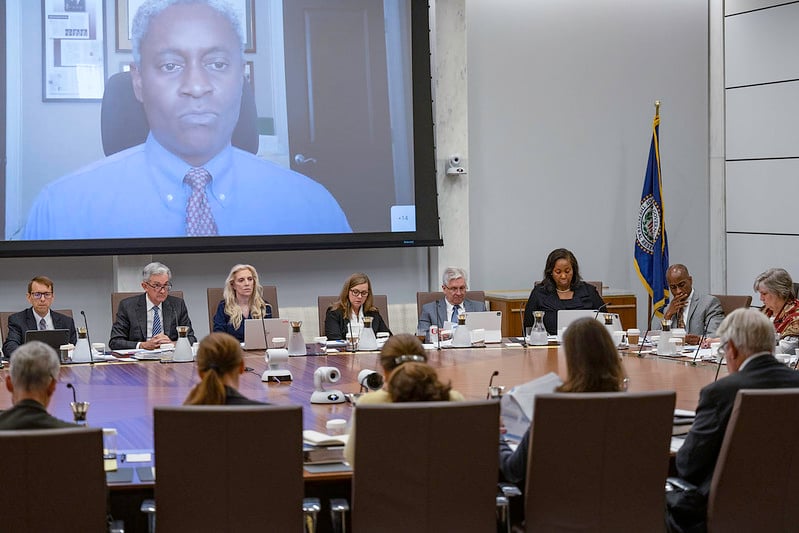The Federal Reserve’s Federal Open Market Committee (FOMC) will behind closed doors discuss how much it should approve a new interest rate increase without causing an economic recession, following inflation figures that exceeded expectations.
Economists expect the Federal Reserve to add 75 basis points over its previous increases. The committee had also implemented in mid-June an increase of 75 basis points and it was the highest since 1994. Traders had alluded to 100 basis points, after the release of inflation figures that recorded 9.1 percent in the month of June, their highest level in more than forty years.
Even a member of the Reserve Board of Governors, Christopher Waller, recently talked about the possibility of a 100-basis points increase.
Therefore, the upcoming decision is subject to many surprises. Note that Federal Reserve Chairman Jerome Powell announced two days ago that “the severity of inflation clearly surprised the monetary authorities,” warning of “the possibility of other surprises.”
In a survey conducted by Bloomberg with a number of economists, opinions show that Federal Reserve Chairman Jerome Powell will slow the pace of interest rate increases after the expected increase on Wednesday. They expect the FOMC to raise interest rates by half a percentage point in September, then switch to quarter point increases at the remaining two meetings of the year.
This will raise the upper range of the central bank’s policy target to 3.5 percent by the end of 2022, the highest level since early 2008.
The formula between reducing inflation and avoiding recession
The difficult task facing the US Central Bank is its success in curbing and reducing inflation without causing an economic recession.
The Fed itself is confident it can walk the line between fighting inflation and recession, but low stock prices and the inverse curves of Treasury market yields, which many see as harbingers of deflation, suggest that investors are not convinced.
The economic reports that will be released during the week will determine whether the Fed’s policy has led or will lead to a recession.
Topping the list is the GDP for the second quarter, which is expected to be negative. The contraction will be the second in a row on top of the decline of 1.6 percent in the first quarter. Two consecutive negative quarters are seen as a sign of recession.
Atlanta’s federal GDP tracks a 1.6 percent decline for the second quarter. Meanwhile, according to Dow Jones, economists’ expectations expect a rise of 0.3 percent.
Diana Swonk, chief economist at KPMG, expects to see a decline of 1.9 percent, but adds that “it’s not a recession yet because unemployment will need to rise as well, by up to half a percent,” she told CNBC.
Janet Yellen
In this context, US Treasury Secretary Janet Yellen said Sunday that US economic growth is slowing and she acknowledged the risk of a recession, but she believes that a recession is “not inevitable.”
Yellen said in televised statements carried by “Reuters”, that the strong US employment figures and consumer spending show that the US economy is not in a recession at the moment.
The sharp rise in employment numbers in the United States in June continued, with 372,000 jobs being created. The unemployment rate also stabilized at 3.6 percent. This was the fourth consecutive month that the number of new jobs exceeded 350,000.
“This is not an economy in a recession… but in a transitional period of slowing growth, this is necessary and appropriate.”
Yellen considered that a recession “is a generalized contraction of the economy. Even if the GDP in the second quarter is negative, we are not in a recession right now.”
“I’m not saying that we will definitely avoid a recession,” she said. “But I think there is a path that keeps the labor market strong and leads to lower inflation.”
Yellen added that inflation is “very high” and that recent interest rate increases are helping to keep prices under control.
In fact, previous interest rate increases are starting to have an effect, at least in terms of slowing demand in the housing market. The real estate market has slowed down sharply due to very high property prices and rising interest rates, according to Julie Smith, a professor of economics at US Lafayette University in Eton, Pennsylvania.
“However, employees still receive thousands of offers for unfilled jobs, and consumption remains high even though sales are high due to inflation,” Smith added.
On the other side of the Atlantic, inflation also prompted the European Central Bank to raise interest rates Thursday for the first time in more than a decade, acknowledging an even faster-than-expected half-point increase, ending the era of negative rates.








